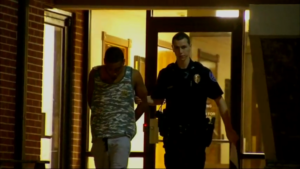A 24 year old father was charged with two counts of involuntary manslaughter and two counts of reckless conduct after leaving his twins inside a hot car in Georgia.
Autopsies are scheduled to be conducted Friday morning in order to determine how long the twins were left inside a hot car in an apartment building in Carollton, Georgia that resulted to the loss of life of the two baby girls.

Neighbors heard screaming and yelling Thursday evening, and called 911.
Georgian police responded and when they arrived at the duplex in Carrollton, the twins were out of the car and in a kiddie pool, where their father was trying to revive them. Frantic neighbors tried to lower their body temperatures using ice packs.
Their father, Asa North, had left them in the back of his SUV, according to police. His desperate efforts to resuscitate them in the pool did not work.
The toddlers, Ariel Roxanne North and Alaynah Maryanne North were not moving when the police came. They were transported to Tanner Medical Center, but did not survive.
North, 24, was arrested early Friday morning on two counts of involuntary manslaughter and two counts of reckless conduct.
“We do believe they were left in the car for a period of time, ” Carrollton Police Capt. Chris Dobbs said, referring to the twins.
The mother was visiting a sick relative out of town at the time, but has since returned to Carrollton, he said. A car at the scene has been impounded.
Autopsies, to be conducted Friday morning will show details that could be crucial in court. North is expected to appear in court on Friday.
At least 26 children have died from heatstroke this year after being left inside cars, according to KidsAndCars, a website that tracks such incidents. That figure is nearly twice as high as the number of children who died by this time last year, the organization said.
On average, 37 children die every year from heat stroke in a vehicle, said Janet Fennell, founder of KidsAndCars.
Cases of kids dying after being left in hot cars have risen since the late 1990s, when the advent of air bags and rear-facing child-seats pushed parents to put their kids in the back of the car, where they are more easily forgotten, experts say.
